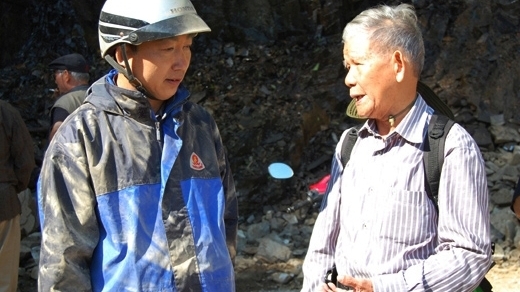Scientific Prof. Dr. Dang Huy Huynh, former Director of the Institute of Ecology and Biological Resources (IEBR), is one of the 10 individuals to receive the 2017 ASEAN Biodiversity Heroes Award. He has donated US$2,000 of his US$5,000 prize money to the operational fund of the Vietnam Association for Conservation of Nature and Environment (VACNE) and used another US$1,000 to finance the IEBR’s study encouragement foundation.

Prof. Dr. Dang Huy Huynh (right) during a survey trip to the Phia Oac – Phia Den special-use forest in Nguyen Binh district, Cao Bang province. Photo: Manh Cuong
At the age of 85, with 60 years of Party membership, Prof. Dr. Dang Huy Huynh, Chairman of the Vietnam Zoological Society, still makes unceasing efforts to mobilise the community’s engagement in the preservation of biodiversity. Excluding several years of combat in the battlefields of the Military Zone 5 and the lower Laos region (1947 - 1954), his whole life has been dedicated to scientific research. Huynh’s achievements, as he said, are owed to his constant study of Uncle Ho’s lifestyle, working style and passion for science.
During his 20 years as the deputy director and then director of the IEBR (under the Vietnam Academy of Science and Technology), Prof. Dr. Huynh chaired and directly implemented dozens of scientific topics at State and ministry levels, despite having to participate in domestic and international specialised organisations, such as the VACNE, the Vietnam Zoological Society, the Vietnam Union of Biological Sciences and the International Primatological Society (IPS). He spent months sitting and walking in the mangrove forests in Cau Mau province’s Ngoc Hien and Nam Can districts, in addition to making long field trips to remote forests and mountainous regions in the provinces of Dak Lak, Gia Lai and Kon Tum in the 1970s.
By spending from four to five months each year in the field, Prof. Dr. Huynh completed many scientific topics and tasks under the Central Highlands Programme 1 and the Central Highlands Programme 2 (1978 - 1988); alongside a programme related to the reasonable use of natural resources and environmental protection; a basic research and investigation into the fauna, parasites and insects in Vietnam’s northern provinces; an ecological base serving as the foundation for the rehabilitation of degraded forest ecosystems and the breeding of precious and rare animal species of conservation and economic value, contributing to the protection of the gene sources of wild animals.
So far, Prof. Dr. Huynh has published over 150 scientific works in prestigious journals, both at home and abroad. Dozens of his monographs have been produced, featuring biology and animal ecology in Vietnam, Sika deer in Vietnam, the list of animals in Vietnam, and the sustainable protection and development of Vietnam’s animal resources.
During his years in charge of the Institute of Ecology and Biological Resources, Huynh was a member of several international organisations, such as the Environmental Education Specialist and the International Primatological Society (IPS), whilst working as a member of the Administrative Council of the Plant Resources of South-East Asia (PROSEA).
Under the PROSEA, in the period of 1991-1999, Prof. Dr. Huynh gathered a number of competent officials at universities and institutes across the country, in collaboration with specialists in the region, to organise more than 10 scientific seminars and conferences, during which international and ASEAN scientists shared their experience in the research and management of natural resources, the sustainable use of plant resources, and the conservation of rare and endangered animals. These locations are regarded by the World Wide Fund for Nature (WWF) to be unique and rich in terms of biodiversity, and to be home to many new and rare species of animals and birds.
From 1990 to 2010, Huynh directed and organised the officials of the IEBR to work with the relevant agencies to investigate, explore and evaluate the status quo of biodiversity in the border areas in the mountainous northern provinces and along the Truong Son Range, in an effort to preserve biodiversity in trans-border regions and in the lower Mekong basin.
The research outcomes have contributed to convincing the ministries and sectors to establish a number of cross-border nature reserves, including the 100,000ha Muong Nhe Nature Reserve (Lai Chau province, Vietnam) and the Phoudendinh nature reserve (Laos); the 54,000ha Vu Quang Nature Reserve (Ha Tinh province, Vietnam) and the Na Kai Nam Thanh Nature Reserve (Khammouane province, Laos), and the 97,000ha Chu Mom Ray National Park (Kon Tum province, Vietnam) and the Via Ra Chay Nature Reserve (Cambodia).
According to Dr. Nguyen Ngoc Sinh, President of the VACNE, Prof. Dr. Huynh is the person who has initiated and contributed significantly to the recognition of nearly 3,000 heritage trees, in 100 species, across 52 cities and provinces nationwide. Huynh has been presented with nearly 20 orders and medals of different types, including the Ho Chi Minh Award on science and technology (twice in 2005 and 2010).